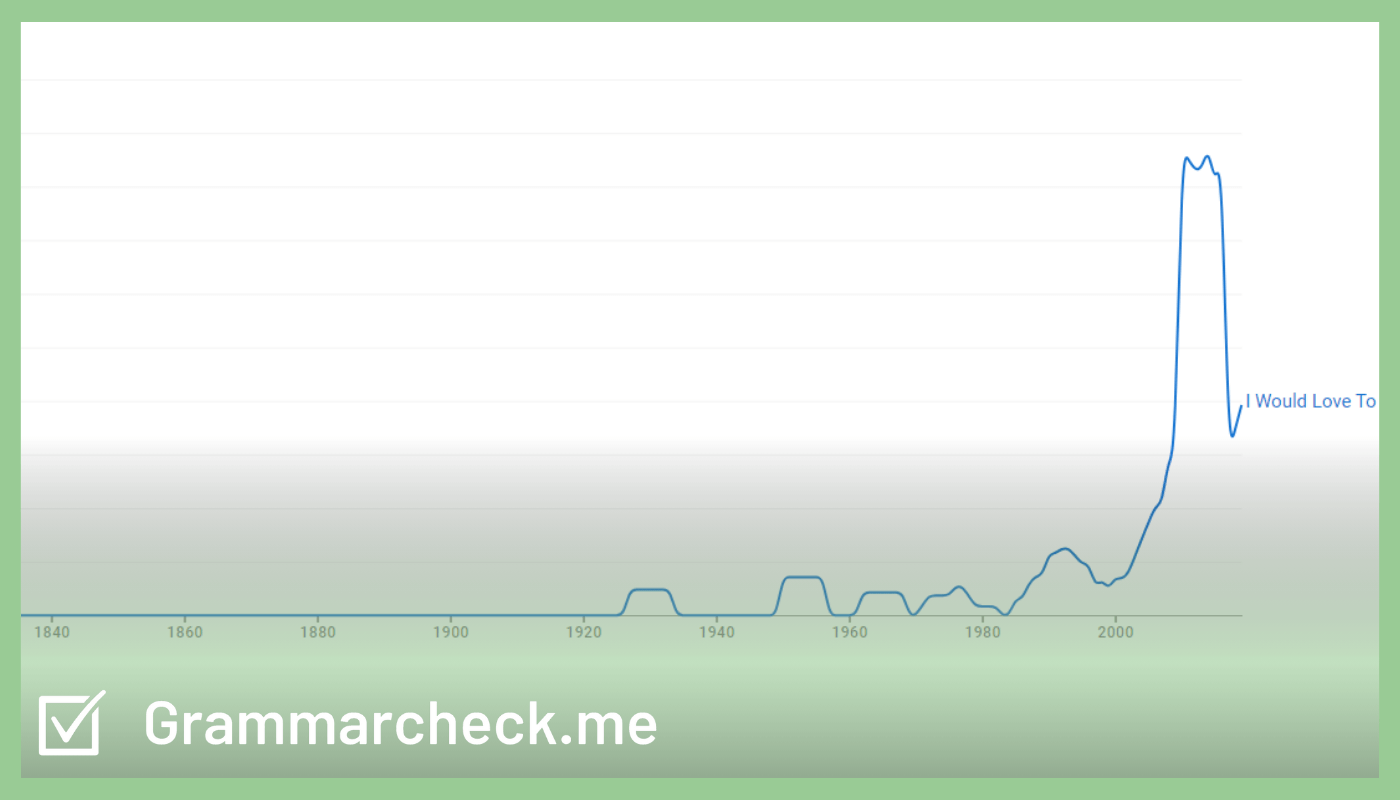The saying “I would love to” is a very polite & enthusiastic way to express willingness or accept an invitation to do something. When someone says “I would love to”, it means they are willing to help you in some manner.
There are many synonyms for “I would love to” including but not limited to “I’d be delighted to”, “I’m eager to”, and “I’m thrilled to”. There are many alternatives to this phrase depending on the specific speaking or writing context.
In this post, we’ll further break down the definition of “I would love to”, common synonyms, and how to use it correctly in a sentence. We’ll also discuss the popularity and origin of this expression in the English language.

What Is The Definition Of “I Would Love To”
The phrase “I would love to” is an expression used to express agreement or strong enthusiasm to do something in the future. When someone says “I would love to”, it signifies they have a genuine interest or willingness to participate in something.
- I would love to go to the football game.
- I would love to pick up Mom after work.
This phrase is most commonly used in informal conversations. It is normally used as a polite wat to accept an invitation or proposal. It would be considered rude to use this expression in situations where the desire or enthusiasm is insincere or sarcastic.
What Are Synonyms For “I Would Love To”?
Here are 15 synonyms for “I would love to”.
- I’d be delighted to. Use this in formal settings, such as accepting a formal invitation to a business event or accepting a request from a superior.
- I’m eager to. Appropriate when expressing excitement about participating in an activity or project, especially in a professional context.
- I’m thrilled to. Suitable for conveying a high level of enthusiasm in personal or casual conversations, like accepting an invitation to a friend’s party.
- I’m keen to. Ideal for expressing your interest or enthusiasm for a specific opportunity, like joining a sports team or taking on a new challenge.
- I’m excited to. Use this synonym to convey your excitement and anticipation, such as when accepting an offer for a new job or internship.
- I’m more than happy to. Appropriate in polite and accommodating situations, such as when offering assistance or help to someone.
- I’m really looking forward to. Perfect for expressing anticipation and enthusiasm for an upcoming event or experience, like a vacation or a special occasion.
- I’d absolutely love to. Use this when you want to emphasize your strong desire to do something, like accepting an invitation to a dream vacation.
- I’m absolutely thrilled to. Suitable for emphasizing a high level of excitement or happiness, especially when accepting an honor or award.
- I’m totally up for it. Informal and casual, best used among friends when expressing eagerness for a fun activity or adventure.
- I’m game for that. Informal and enthusiastic, appropriate when accepting an informal invitation for an exciting activity or challenge.
- I’m wholeheartedly in. Expresses complete commitment and enthusiasm, typically used in passionate discussions or accepting a significant responsibility.
- I’d jump at the chance. Indicates eagerness and a strong desire to seize a valuable opportunity, often used when presented with a unique experience or offer.
- I’m absolutely on board. Appropriate for accepting an idea or proposal with enthusiasm, especially in collaborative settings or group discussions.
- I’m ready and willing. Conveys a readiness and eagerness to assist or participate, often used in response to a request for help or support.

Just like we saw in our analysis of the phrase thanks for your cooperation, synonyms can be a great way to add variety to your writing.
Which Is The Best Synonym Of “I would Love To” For Formal Contexts?
The best synonym of “I would love to” for formal contexts is “I’d be honored to.” This phrase conveys enthusiasm and willingness in a polite and formal manner, making it suitable for professional or formal settings, such as accepting invitations to business events or responding to formal requests.
For Example: “I’d be honored to accept this job opportunity.”
How Do You Use “I Would Love To” In A Sentence?
Below are 5 sentence examples that contain the phrase “I would love to”.
- When you invited me to your charity gala, I would love to attend and support your cause.
- I received your offer to join your team, and I would love to discuss the details further.
- If it’s not too much trouble, I would love to have a copy of that report by tomorrow morning.
- Your idea for a weekend getaway sounds fantastic, and I would love to join you for the adventure.
- Thank you for considering me for the role; I would love to contribute my expertise to your project.
Just like we saw in our post about the phrase “continued support“, writers need to understand context before picking their word choice.
What’s The Origin Of “I Would Love To”?
The saying “I would love to” cannot be tied to a specific origin. This phrased has been used as a way to accept a request or invitation for many years. It has been used in novels, movies, and many different informal settings. And just like we learned in our analysis of the expression “we were“, many of the most popular phrases do not have a single origin.
Popularity Analysis
The phrase “I would love to” is very popular in standard English speaking countries. Google’s own Ngram viewer data shows that it is used frequently in a variety of different published writings. The popularity is likely due to the wide variety of use cases this phrase can have. However, like we already mentioned a more formal alternative should be used in business or academic writing. And just like we learned in our post about the expression slow is smooth, the popularity of certain vocabulary can change significantly over time.

What’s The Opposite Of “I Would Love To”?
The opposite of the phrase “I would love to” is to reject an offer or invitation. Here are 3 antonym phrases for “I would love to”.
- I Would Hate To
- I Don’t Want To
- I’m Unwilling To
Frequently Asked Questions
You should avoid using the phrase “I would love to” in formal contexts. Instead, you should use a more professional synonym like “I’d be honored to” or “I’d be glad to”.
The Bottom Line
By now you should be an expert on the meaning of the phrase “I would love to”. This saying is used to respond to an invitation or request for a specific action. If you are looking for alternative phrases, consider picking one of our “I would love to” synonyms instead. You can also pick a more professional alternative if necessary. If you need help with similar grammar rules like this, consider using our tool for grammar checking to make things easy!
